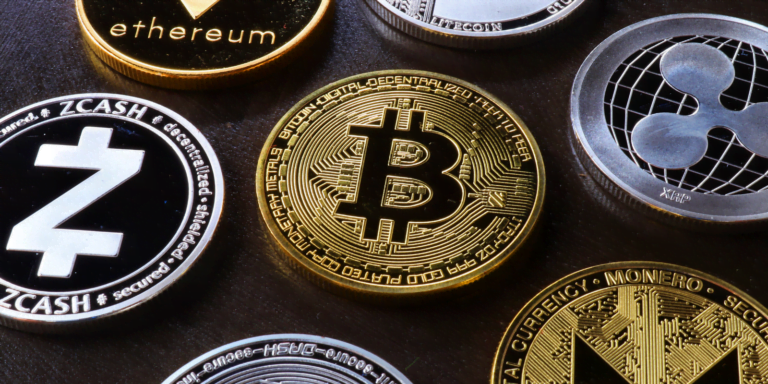Table of Contents
ToggleCryptocurrencies are all the rage right now. Bitcoin, Ethereum, and USDT are the most popular cryptos on the market. But what are they? How do they work? And which one should you invest in? In this blog post, we will be comparing crypto assets like Bitcoin, Ethereum, and USDT and help you decide which one is right for you.
An Introduction to digital currency
Digital currency is an encrypted virtual medium of exchange that stands independent from the control and influence of any government or financial institution. This innovative form of payment utilizes cryptography to ensure its secure transactions, while also regulating the creation of additional units.
Cryptocurrencies are traded on decentralized exchanges and can also be used to purchase products and services. While there is no single authority governing cryptocurrency, it is considered to be a legal tender in some countries. Some key benefits of cryptocurrency include security, anonymity, fast and low-cost transactions, and global accessibility.
Popular cryptocurrencies
The popularity of cryptocurrencies has surged in recent years, with Bitcoin and Ethereum becoming two of the most popular digital currencies. Cryptocurrencies are often volatile and can experience large price swings.
Bitcoin
Bitcoin is a revolutionary digital currency that utilizes groundbreaking peer-to-peer technology to provide instantaneous payments. Unlike other traditional currencies, Bitcoin operates independently from government and bank control, offering freedom and autonomy for users all over the world.
Bitcoin is produced as compensation for individuals or organizations who utilize their computing capacity to validate and document payments through mining. In return, they receive transaction fees and newly minted Bitcoin. In addition to being mined, bitcoin can be earned through exchanging goods, services, and fiat currency. You may even transfer or receive digital coins electronically with a slightly additional fee for the transaction.

Ethereum
The Ethereum coin is a project the revolutionary platform that runs smart contracts: applications that execute precisely as programmed with no risk of fraud or third-party interference. Ethereum’s Turing completeness means it can power any application, including those requiring the handling of sensitive data such as money and personal information.
Ethereum was invented by Vitalik Buterin and launched in 2015. The Ethereum Foundation is a Swiss non-profit organization, established in Zug, Switzerland to promote and support the Ethereum platform.
Tether
Tether is a cryptocurrency token based on the Bitcoin blockchain, said to be backed by an equal amount of fiat currency held in reserve. Tether claims to have a 1-to-1 peg with USD, however, it has been met with academic and public criticism for its lack of full disclosure and transparency about how much money it actually holds in circulation. With a plethora of fraud-related controversies and accusations hounding it, Tether has faced intense scrutiny over its relationship with Bitfinex but it doesn’t affect its popularity and many people opted to buy Ttether even after these controversies.

Similarities between Bitcoin and Ethereum
1. Decentralized
This means that there is no central authority controlling them. Instead, they are controlled by the network of users that use them.
2. Use blockchain technology
Blockchain is a distributed ledger technology that allows for secure and transparent transactions.
3. Open-source
This means that anyone can view the code and make modifications to it.
4. Limited supply
There will only ever be 21 million Bitcoin mined and there is a hard cap of 18 million ETH that can be mined per year while tether depends on the amount of USDs in reserve.
5. Traded on exchanges
You can sell and buy BTC in Dubai and other parts of the world as well as Tether and ETH on cryptocurrency exchanges.
Comparing Crypto Assets: Key Differences
- Bitcoin is the most well-known cryptocurrency and was the first to be created.
- Ethereum is a decentralized platform that runs smart contracts.
- Tether is a cryptocurrency that is pegged to the US dollar.
- Bitcoin can be used to purchase goods and services.
- Ethereum can be used to develop decentralized applications.
- Tether can be used to store value or make purchases
Proof of work vs. Proof of Stake
In Proof of Work, the algorithm requires participants to use computing power to solve a mathematical puzzle. The first participant to solve the puzzle is then rewarded with new cryptocurrency tokens.
In Proof of Stake, the algorithm instead requires participants to hold onto their cryptocurrency tokens in order to be eligible to verify new transactions and earn rewards. This system is seen as more efficient because it doesn’t require as much energy (and thus, expense) as Proof of Work.
One Place where you can buy all Crypto Assets
There are only a few places where you can buy all crypto assets. The most popular one is probably an over-the-counter (OTC) store that allows you to buy and sell cryptocurrencies directly. The most popular one is Sell USDT in Dubai.
Advantages of crypto assets
1. Decentralization
One of the key advantages of crypto assets is that they are decentralized. This means that they are not subject to the control of any central authority, such as a government or financial institution. This decentralization gives crypto assets a number of advantages, including greater security and transparency.
2. Security
Crypto assets are also more secure than traditional assets, such as stocks and bonds. This is because crypto assets are not subject to the same level of regulation as traditional assets. Crypto assets are also less likely to be counterfeited, as they are not physical objects that can be replicated.
3. Transparency
Crypto assets are also more transparent than traditional assets. This is because all transactions involving crypto assets are recorded on a public ledger, known as the blockchain. This ledger is available for anyone to view, which makes it difficult for anyone to commit fraud or hide illegal activity.
4. Lower Fees
Another advantage of crypto assets is that they typically have lower fees than traditional assets. This is because there are no middlemen, such as banks or brokers, involved in the transaction. Crypto assets are also often traded on decentralized exchanges, which further reduces fees.
5. Availability
Crypto assets are also more available than traditional assets. This is because they can be traded 24 hours a day, 7 days a week. Traditional assets, such as stocks and bonds, can only be traded during business hours on weekdays.
6. Accessibility
Crypto assets are also more accessible than traditional assets. This is because anyone with an internet connection can trade crypto assets. Traditional assets, such as stocks and bonds, typically require a broker or other professional intermediary to trade them.
7 . Flexibility
Another advantage of crypto assets is their flexibility. For example, Bitcoin can be used to buy goods and services, or it can be held as an investment. Some altcoins, such as Ethereum, can also be used to build decentralized applications.
Risks Analysis of Crypto Assets
1. Lack of Regulation
One of the biggest risks associated with investing in cryptocurrencies is the lack of regulation. Cryptocurrencies are not subject to the same rules and regulations as other financial assets, which makes them more volatile and risky. Additionally, there is no guarantee that your investment will be safe from fraud or theft, as there are no government-backed protections in place.
2. Volatile Prices
Another risk associated with cryptocurrencies is their volatile prices. Cryptocurrency prices can fluctuate wildly and have been known to drop by double-digit percentages overnight. This volatility makes it difficult to predict how your investment will perform in the future and can lead to substantial losses if you’re not careful.
3. Hackers and Scammers
Because cryptocurrencies are not regulated, they are often used by hackers and scammers to defraud investors. There have been numerous cases of people losing their entire investments to fraud or exchanges that have been hacked. If you’re considering investing in cryptocurrencies, it’s important to do your research and only invest in reputable projects.
4. Limited Usefulness
While some cryptocurrencies have been adopted by businesses and can be used to purchase goods and services, most are not yet widely accepted. This limited use means that there is less demand for these assets, which can lead to lower prices. Additionally, if you’re holding a cryptocurrency that isn’t being used much, it may be difficult to find someone willing to buy it from you.
5. Risk of Government Intervention
Another risk to consider is the possibility of government intervention. Because cryptocurrencies are not regulated by any government, there is a risk that they could be banned entirely in some jurisdictions. This would likely cause the value of all cryptocurrencies to plummet and could lead to substantial losses for investors.
Point of Tether over Bitcoin and Ethereum
The point of the tether between Bitcoin and Ethereum is that it is a more stable store of value. While Bitcoin and Ethereum prices are prone to dramatic swings, the value of tether has remained much more stable. This makes it a more reliable option for those looking to use cryptocurrencies as a stable store of value.
FAQs
What are the 3 types of crypto coins?
There are three types of crypto coins:
1. Utility tokens
These are tokens that are used to access services on a blockchain network. For example, Filecoin is a utility token that can be used to store files on the Filecoin network.
2. Security tokens
These are tokens that represent ownership in a company or asset. For example, there is a security token that represents ownership in the tZero company.
3. Payment tokens
These are tokens that can be used to pay for goods and services. For example, Bitcoin is a payment token that can be used to pay for goods and services online.
Why is Bitcoin compared to digital gold and Ethereum to digital silver?
Bitcoin is digital gold because its finite supply and inherent scarcity make it a desirable store of value. And Ethereum is digital silver because it’s higher liquidity and faster transaction speeds make it a better choice for everyday transactions.
What is Bitcoin Ethereum’s share of the crypto market?
Ethereum’s market share of the crypto market is about 18.8%. Bitcoin’s market share is about 39.6%. The rest of the market is made up of a variety of other cryptocurrencies.
How many BTC and ETH are currently in circulation?
There are currently 16,835,000 Bitcoins in circulation while there are currently 97,690,000 Ethereum in circulation.
How to invest in Bitcoin and Ethereum?
There are a few ways to invest in Bitcoin and Ethereum. Here are a few options:
1) Buy Bitcoin or Ethereum directly from an OTC exchange.
2) Use a cryptocurrency broker to buy Bitcoin or Ethereum with your bank account or credit card.
3) Create a digital currency wallet where you can store your Bitcoin or Ethereum. You can then use this wallet to buy goods and services online, or you can sell your Bitcoin or Ethereum for cash.
Should I consider any other crypto than Bitcoin and Ethereum?
There are a number of other cryptos that you may want to consider, including Ripple, Litecoin, and Dash. Each has its own unique features and benefits. But there is no need to consider any other cryptos than Bitcoin and Ethereum. These are the two largest, most well-known, and most trusted cryptos. They have the highest market caps and the most active developers and communities. There is a lot of potential for growth in both Bitcoin and Ethereum, so they are two of the best options for investment at this time.
How to compare two cryptos?
There are a few things you can consider when comparing two cryptos:
1) Their respective market caps (i.e. the total value of all the coins in circulation)
2) Their trading volumes (i.e. the number of coins that have been traded over a given period of time)
3) Their price history (i.e. how much each coin has been worth at different points in time)
Final Words
Cryptocurrencies like Bitcoin, Ethereum, and Tether that underlie them are rapidly evolving and growing in popularity. There is no doubt that they are here to stay and will play a big role in the future of finance and many other industries. Whether or not cryptocurrencies will become the global standard remains to be seen, but there is no doubt that they have the potential to revolutionize how we interact with the digital world.





